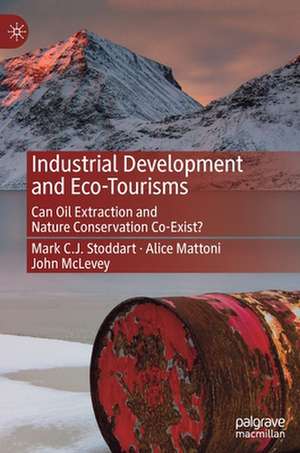Industrial Development and Eco-Tourisms: Can Oil Extraction and Nature Conservation Co-Exist?
Autor Mark C.J. Stoddart, Alice Mattoni, John McLeveyen Limba Engleză Hardback – 8 oct 2020
| Toate formatele și edițiile | Preț | Express |
|---|---|---|
| Paperback (1) | 637.59 lei 43-57 zile | |
| Springer International Publishing – 9 oct 2021 | 637.59 lei 43-57 zile | |
| Hardback (1) | 641.85 lei 43-57 zile | |
| Springer International Publishing – 8 oct 2020 | 641.85 lei 43-57 zile |
Preț: 641.85 lei
Preț vechi: 755.13 lei
-15% Nou
Puncte Express: 963
Preț estimativ în valută:
122.81€ • 128.58$ • 101.62£
122.81€ • 128.58$ • 101.62£
Carte tipărită la comandă
Livrare economică 07-21 aprilie
Preluare comenzi: 021 569.72.76
Specificații
ISBN-13: 9783030559434
ISBN-10: 3030559432
Pagini: 235
Ilustrații: XIX, 235 p. 15 illus., 7 illus. in color.
Dimensiuni: 148 x 210 mm
Greutate: 0.46 kg
Ediția:1st ed. 2020
Editura: Springer International Publishing
Colecția Palgrave Macmillan
Locul publicării:Cham, Switzerland
ISBN-10: 3030559432
Pagini: 235
Ilustrații: XIX, 235 p. 15 illus., 7 illus. in color.
Dimensiuni: 148 x 210 mm
Greutate: 0.46 kg
Ediția:1st ed. 2020
Editura: Springer International Publishing
Colecția Palgrave Macmillan
Locul publicării:Cham, Switzerland
Cuprins
Chapter 1: Introduction: Contact Points between Offshore Oil and Nature-Based Tourism.- Chapter 2: The North Atlantic as Object of Inquiry.- Chapter 3: Cultural Dimensions of the Oil-Tourism Interface.- Chapter 4: Environmental Governance and the Oil-Tourism Interface.- Chapter 5: Environmental Movement Conflict and Collaboration in the Oil-Tourism Interface.- Chapter 6: Lessons Learned and Social Futures: Building Social-Ecological Wellbeing in Coastal Communities.- Chapter 7: Epilogue on Methodology.
Notă biografică
Mark C.J. Stoddart is Professor in the Department of Sociology, Memorial University of Newfoundland, Canada. His work appears in Global Environmental Change, Organization & Environment, Energy Research & Social Science, Environmental Politics, and Environmental Communication.
Alice Mattoni is Associate Professor in the Department of Political and Social Sciences at the University of Bologna, Italy. Her work appears in: Communication Theory, European Journal of Communication, Information, Communication and Society, and Social Movement Studies.
John McLevey is Associate Professor in the Departments of Knowledge Integration, Sociology, and Geography & Environmental Management at the University of Waterloo, Canada. His substantive research interests are primarily in the fields of political, cognitive, and environmental social science.
Textul de pe ultima copertă
“Eco-tourism and extractive industries may seem unlikely bedfellows but the reality is that, in many parts of the world, governments pursue both. By examining the politics and cultures of oil and tourism in the North Atlantic, Stoddart, Mattoni and McLevey shed new light on how contradictions and conflicts between the two development paths are managed and, critically, where opportunities to promote more positive social and ecological futures lie. I thoroughly recommend it.”
-Stewart Lockie, Distinguished Professor of Sociology, James Cook University, Australia
This book examines the “oil-tourism interface”, the broad range of direct and indirect contact points between offshore oil extraction and nature-based tourism. Offshore oil extraction and nature-based tourism are pursued as development paths across the North Atlantic region. Offshore oil promises economic benefits from employment and royalty payments to host societies,but is based on fossil fuel-intensive resource extraction. Nature-based tourism, instead, is based on experiencing natural environments and encountering wildlife, including whales, seals, or seabirds. They share social-ecological space, such as oceans, coastlines, cities and towns where tourism and offshore oil operations and offices are located. However, they rarely share cultural or political space, in terms of media coverage, public debate, or policy discussion that integrates both modes of development. Through a comparative analysis of Denmark, Iceland, Newfoundland and Labrador, Norway, and Scotland, this book offers important lessons for how coastal societies can better navigate relationships between resource extraction and nature-based tourism in the interests of social-ecological wellbeing.
Mark C.J. Stoddart is Professor in the Department of Sociology, Memorial University of Newfoundland, Canada. His work appears in: GlobalEnvironmental Change, Organization & Environment, Energy Research & Social Science, Environmental Politics, and Environmental Communication.
Alice Mattoni is Associate Professor in the Department of Political and Social Sciences at the University of Bologna, Italy. Her work appears in: Communication Theory, European Journal of Communication, Information, Communication and Society, and Social Movement Studies.
John McLevey is Associate Professor in the Departments of Knowledge Integration, Sociology, and Geography & Environmental Management at the University of Waterloo, Canada. His substantive research interests are primarily in the fields of political, cognitive, and environmental social science.
Caracteristici
Discusses the contact points between offshore oil extraction and nature-based tourism Offers important lessons for how coastal societies can navigate resource extraction and nature-based tourism Explores how this conflict affects coastal communities social-ecological wellbeing.
